Hello, I'm Olga Fedoseeva, Founder and CEO of UnitiQ | Talent Solutions On-Demand. It’s clear that many organizations are running on autopilot, mistaking busyness for productivity.
This approach might work in the short term, but it stifles long-term innovation and burns out the workforce. The solution requires a cultural shift towards valuing deep thinking and reflection, something often deprioritized in favor of quick fixes and constant communication.
Encouraging structured thinking time and reducing meeting overload could unlock immense untapped potential in organizations. Companies that embrace these changes stand to gain not only in efficiency but also in creativity and employee satisfaction. You also can listen to our podcast episode on Youtube.
This approach might work in the short term, but it stifles long-term innovation and burns out the workforce. The solution requires a cultural shift towards valuing deep thinking and reflection, something often deprioritized in favor of quick fixes and constant communication.
Encouraging structured thinking time and reducing meeting overload could unlock immense untapped potential in organizations. Companies that embrace these changes stand to gain not only in efficiency but also in creativity and employee satisfaction. You also can listen to our podcast episode on Youtube.
Challenges of Thinking in Organizations: Why Don’t We Think as We Can?
Many companies today struggle with decision-making and innovation. Yet, few recognize the root cause of these issues: the lack of deliberate and conscious thinking. All too often, thinking in organizations is mistaken for emotional reactions or automatic responses. In this discussion, we’ll explore why fostering conscious thinking in the workplace is so difficult and what obstacles hinder effective problem-solving.
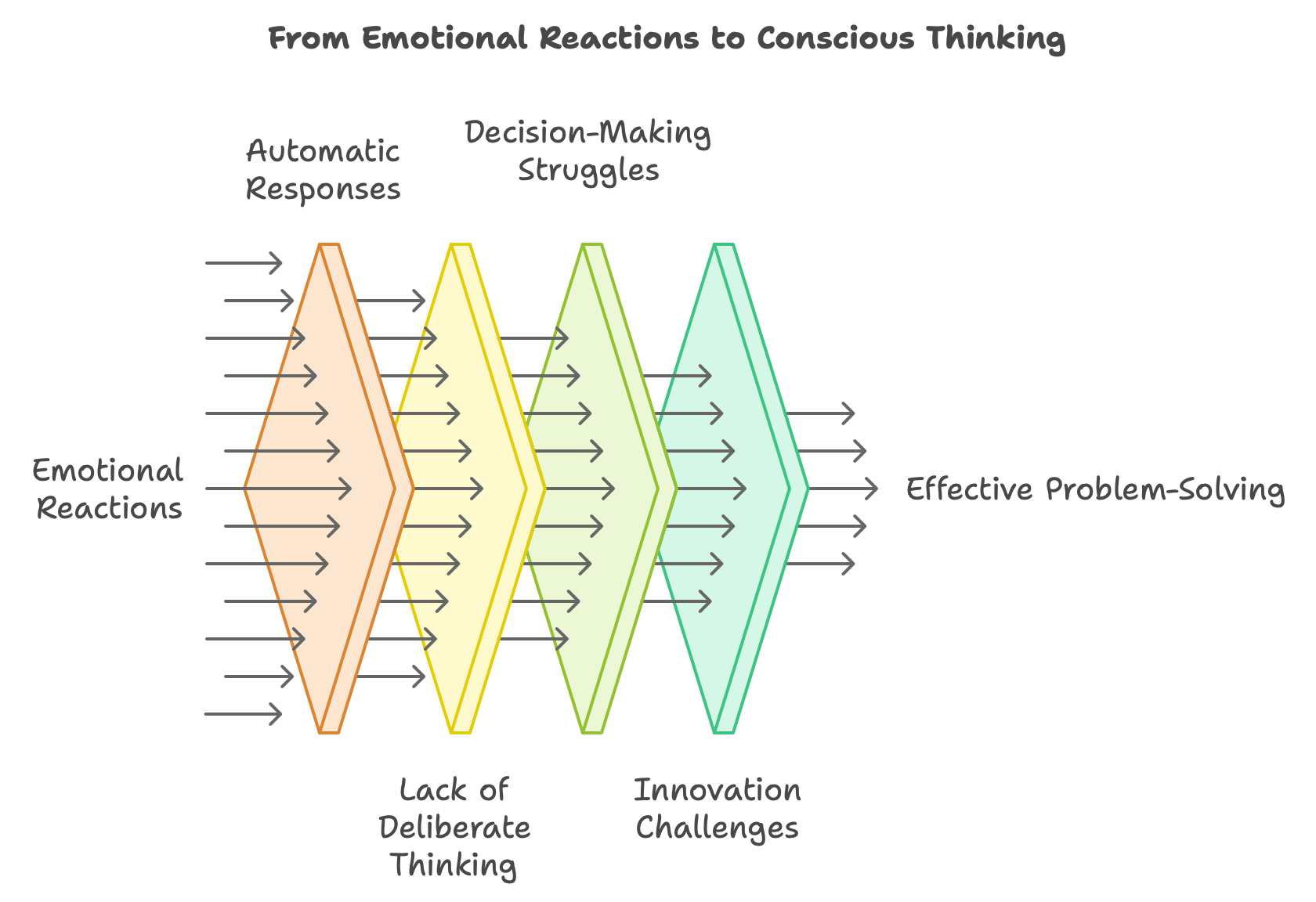
1. People Don’t Really Think—Reflexes Take Over
One of the most common misconceptions is that people naturally think if they are stressed or preoccupied. However, emotions and reflexive reactions are not the same as conscious thinking. In many cases, employees default to established behavior patterns, responding to situations based on habits or past experiences rather than thoughtful consideration. We observe automatic behaviors, such as:
- People opting for familiar solutions because they require less effort.
- Experiencing stress or worry over a task is mistakenly perceived as critical thinking when it’s actually just an emotional reaction.
- Few employees are able to discern between thoughts that lead to meaningful problem-solving and those that result in quick, shallow responses.
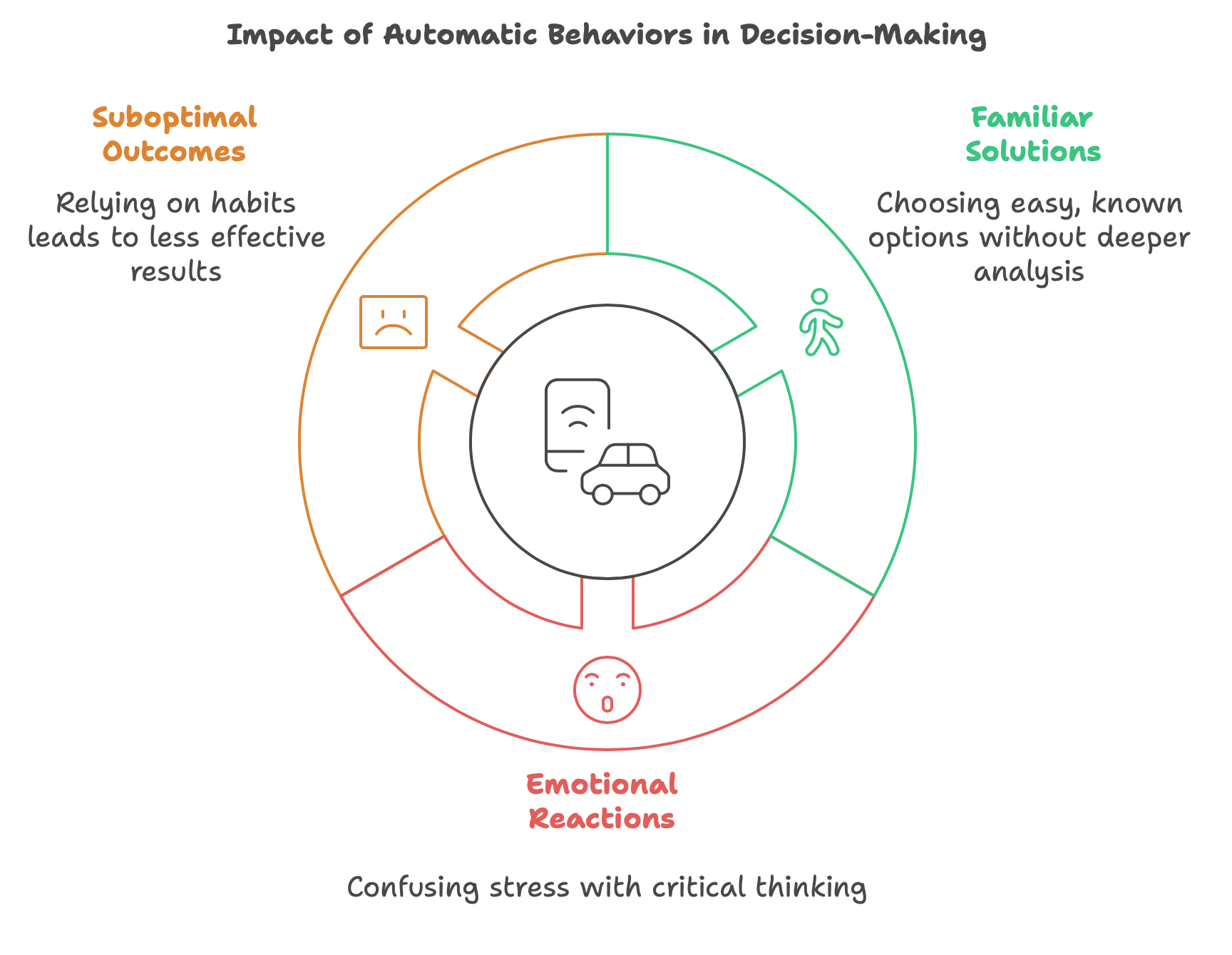
In other words, organizations often underestimate the complexity and importance of conscious thought. Employees are forced to rely on autopilot decision-making and habitual experience, which rarely leads to optimal outcomes.
2. Lack of Time for Thinking: An Overlooked Deficit
Another critical issue is the lack of dedicated time for reflective thinking and problem-solving. In most companies, thinking isn’t integrated into the workflow. Instead, work hours are consumed by communication and immediate actions. This forces employees to resolve tasks on autopilot, choosing the first solution that comes to mind instead of weighing multiple alternatives. Key barriers to thoughtful decision-making include:
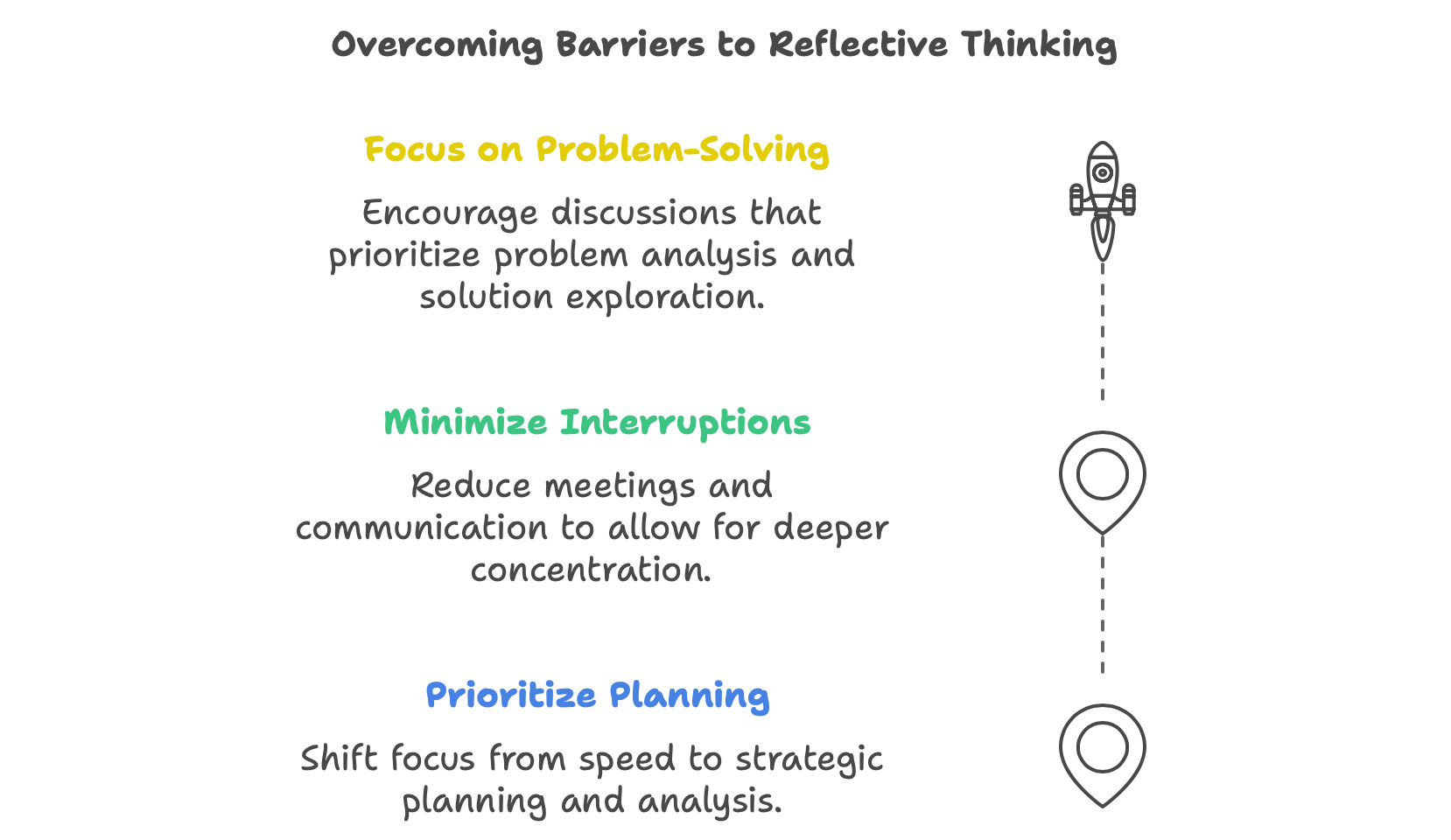
- Planning and analysis are often neglected because completing tasks “as quickly as possible” takes priority.
- Numerous meetings and constant communication interrupt deep concentration and meaningful work. Switching between tasks further dilutes focus.
- A significant portion of time is spent discussing current tasks and operational details rather than analyzing problems or exploring new solutions.
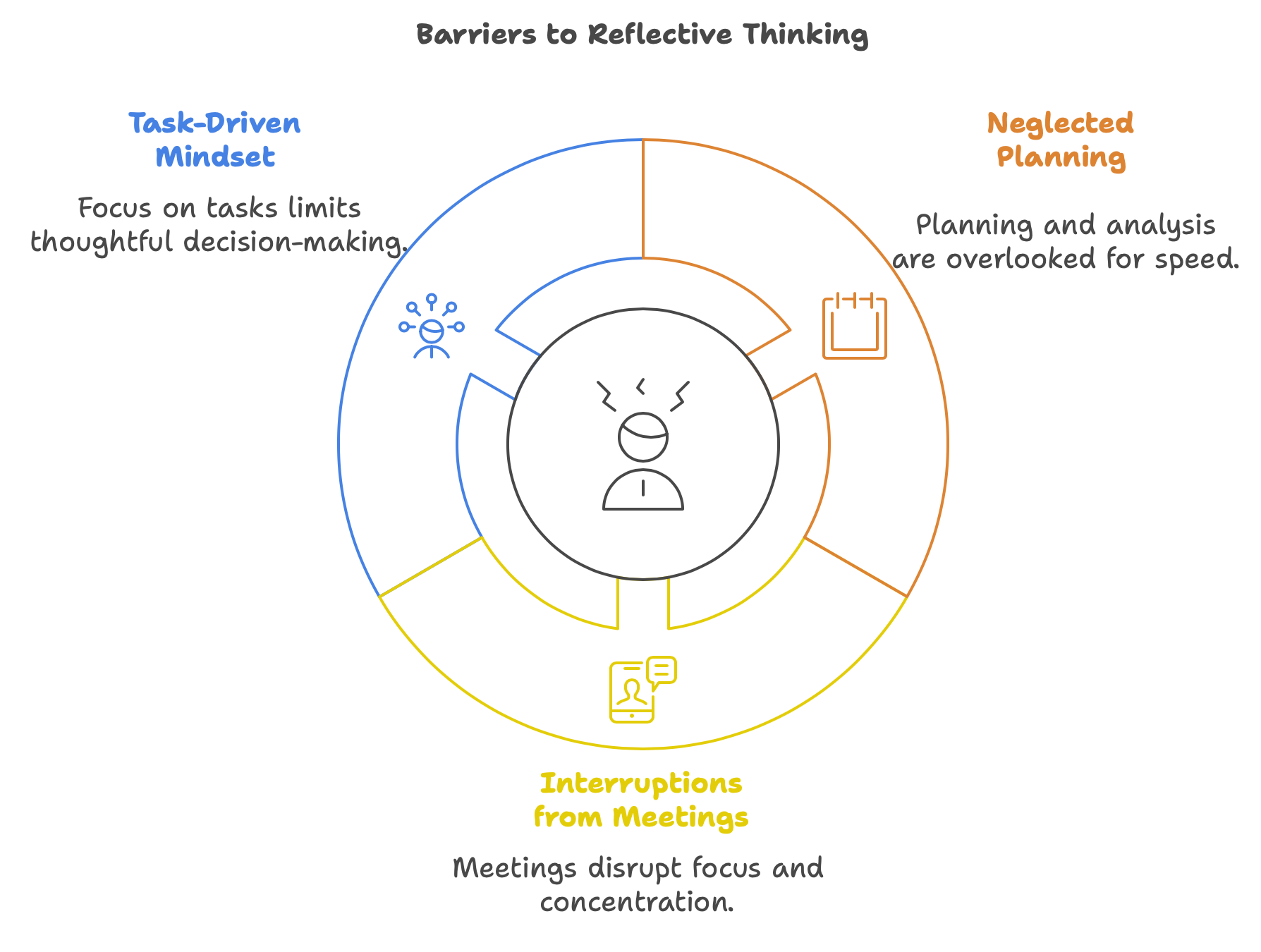
3. Meetings: Discussion Isn’t the Same as Thinking
Many organizations mistakenly believe that meetings represent a thinking process, though this isn’t necessarily true. At best, meetings serve as platforms for presenting pre-existing ideas and outcomes from prior reflection, rather than places where new thoughts are generated. Often, meetings only create the illusion of discussion and deep analysis. In reality, most meetings involve:
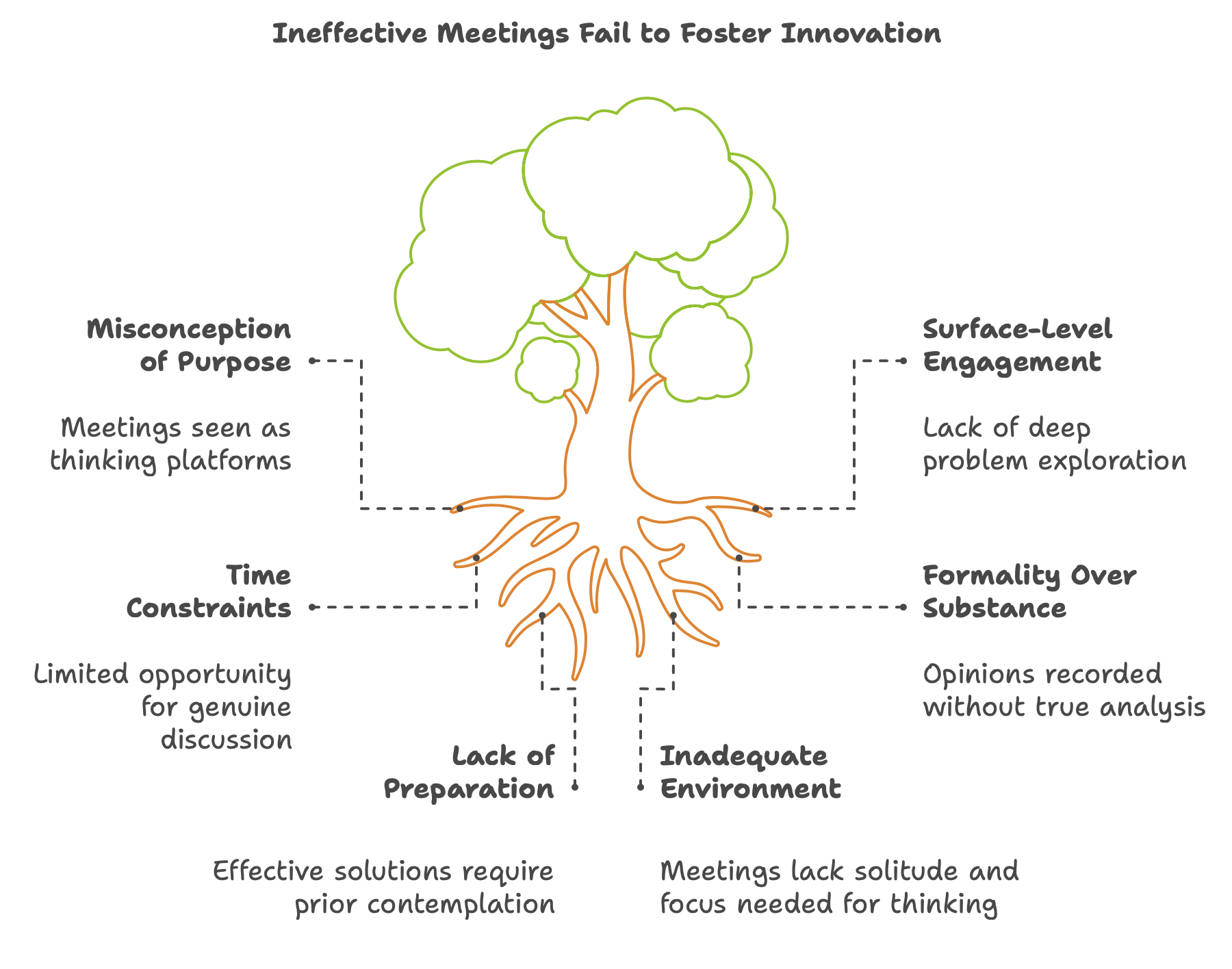
- The exchange of information: Employees share what’s already known, but new ideas and solutions rarely emerge.
- Addressing surface-level issues: The time constraints and structure of meetings prevent participants from delving deeply into problems.
- Formal discussions: Participants’ opinions are recorded as a formality, rather than for genuine analysis or innovation.
Therefore, meetings are not a substitute for thinking—they’re merely a form of communication. True thinking requires time, solitude, and focus, which are rarely available during meetings. Effective solutions come not from the meetings themselves but from the prior preparation and contemplation that must happen outside of them.
4. Consequences of the Absence of Thoughtful Thinking in Organizations
When thinking is replaced by automatic reactions and meetings devolve into surface-level discussions, it leads to a number of negative consequences:
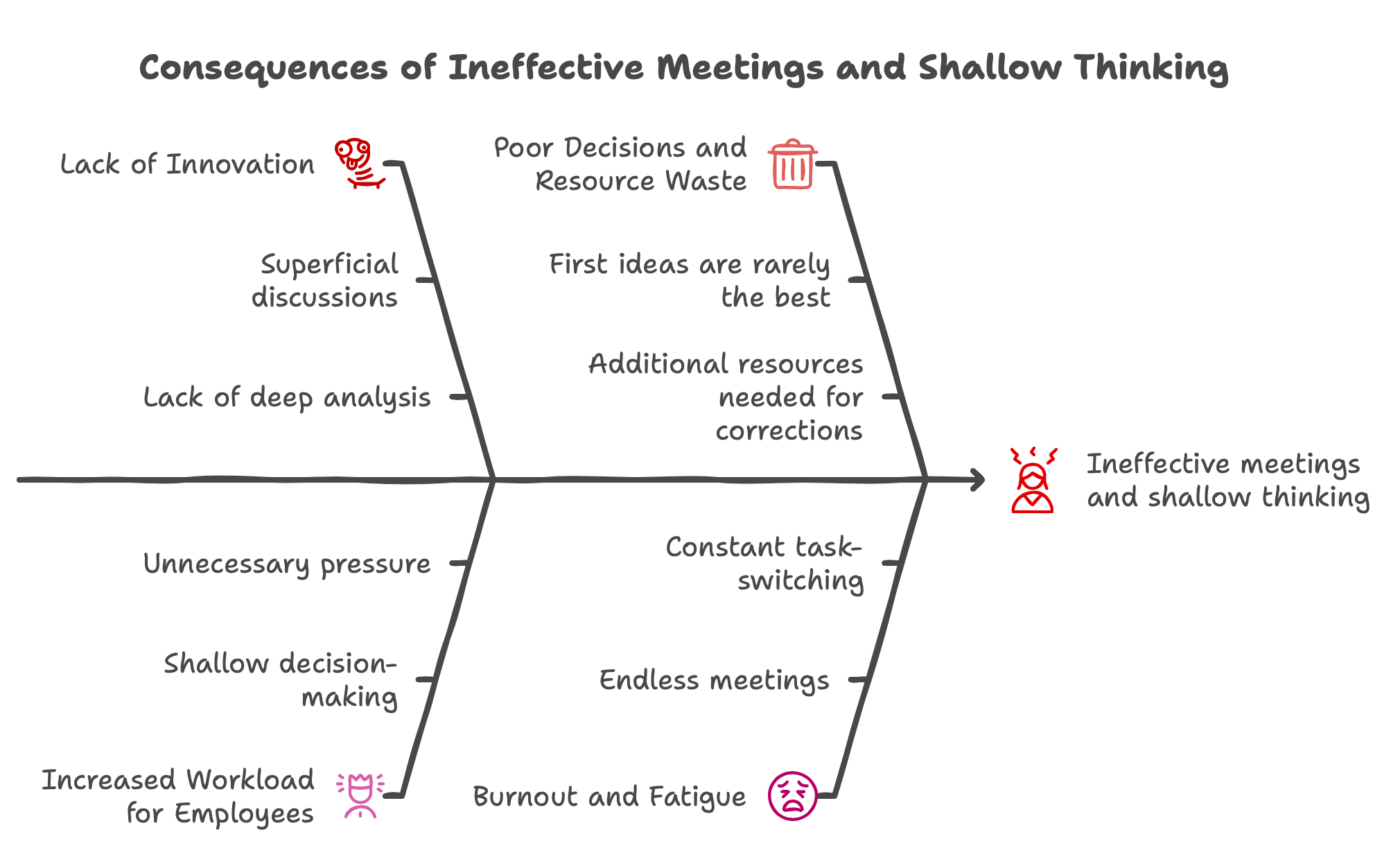
- Lack of Innovation: Without deep analysis, it’s hard to come up with new, valuable ideas. Ideas remain superficial and based on guesses or stereotypes.
- Increased Workload for Employees: Due to the shallow nature of decisions, work often needs to be redone, causing unnecessary pressure.
- Poor Decisions and Resource Waste: The first idea that comes to mind is rarely the best. Correcting mistakes requires additional resources.
- Burnout and Fatigue: Endless meetings and constant task-switching drain employees, reducing their productivity.
5. How to Foster Thinking in Organizations
Breaking free from the cycle of automatic decisions and shallow solutions requires companies to rethink their approach to work and time management. Here are some key steps:
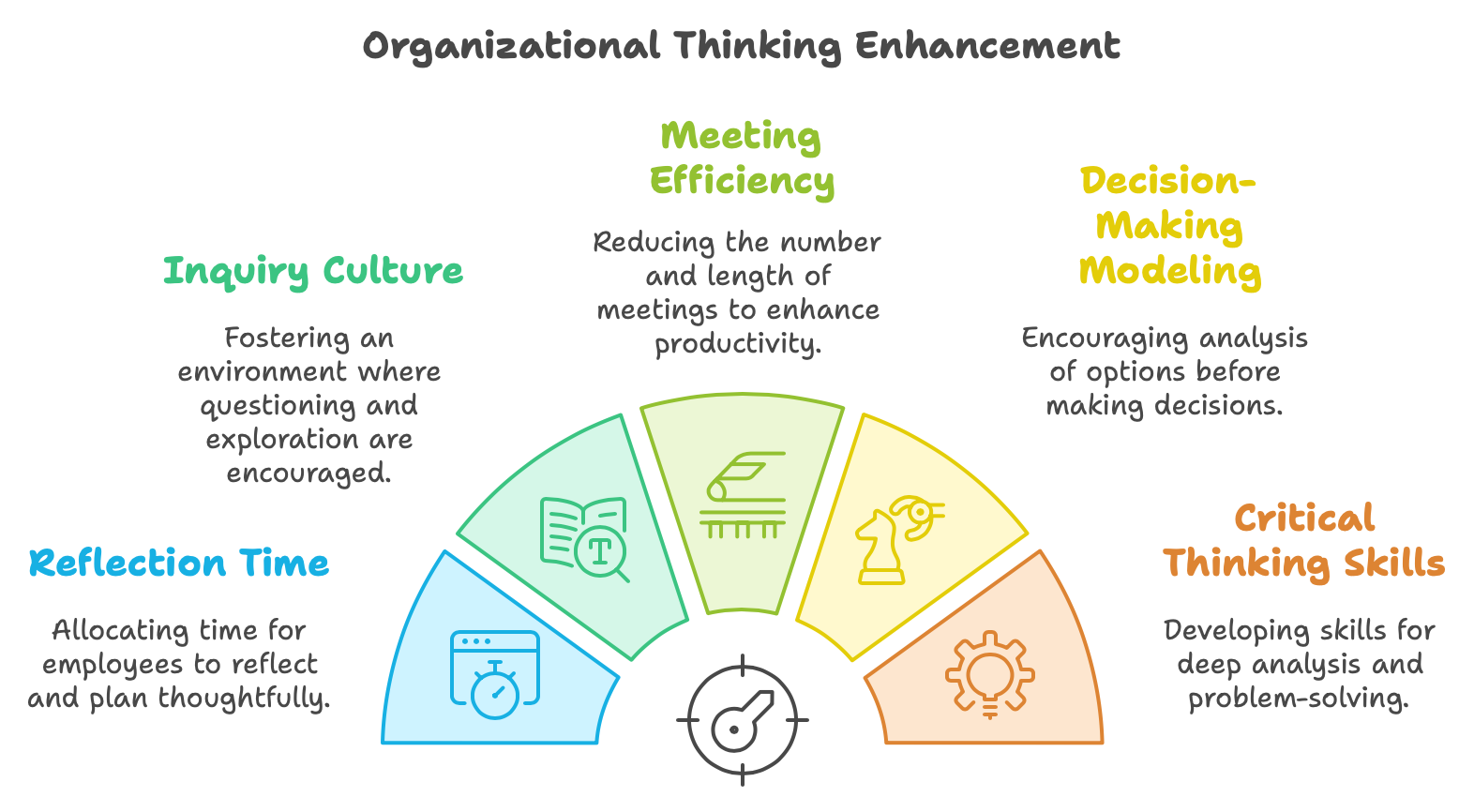
- Allocate Time for Reflection: Thoughtful analysis and planning must be built into the process. For example, regular “thinking pauses” can be introduced, where employees evaluate their progress and seek new solutions. A good rule of thumb is to dedicate 20% of work time to these “thinking breaks.”
- Create a Culture of Inquiry: Encourage employees to ask questions and explore problems from multiple angles, rather than seeking quick answers.
- Limit the Number and Length of Meetings: Many issues can be resolved without meetings. It’s better to reduce the number of meetings and focus on discussing pre-prepared solutions rather than wasting time on superficial discussions.
- Model Decision-Making: Rather than jumping to the first solution, employees should be given the opportunity to analyze different options and predict their outcomes.
- Develop Critical and Systemic Thinking Skills: Training employees in methods of analysis and problem-solving helps them transition from impulsive reactions to well-considered actions.
Thinking is more than emotions, reflexive reactions, or meeting discussions. For organizations to solve problems effectively, they must actively cultivate the ability for deep, deliberate analysis. Meetings and discussions don’t replace thinking—they merely capture the results.
Without providing time and space for thoughtful reflection, companies risk being stuck in a cycle of shallow decisions and routine processes. Shifting the focus from task completion to meaningful analysis and planning will not only boost efficiency but also pave the way for innovation and long-term success.
Without providing time and space for thoughtful reflection, companies risk being stuck in a cycle of shallow decisions and routine processes. Shifting the focus from task completion to meaningful analysis and planning will not only boost efficiency but also pave the way for innovation and long-term success.
Final Thoughts: To maximize an organization's potential, the act of thinking must become a deliberate, encouraged practice at all levels—not just among leaders but all employees who are prepared to engage in it. While it may not be necessary for everyone to focus on the same problem, fostering an environment where each person has time to reflect on their own responsibilities is critical. Companies need to tap into the full cognitive potential of their workforce to reach maximum effectiveness.
I recommend you to read our related articles:
Mastering Situational Leadership: How to Drive Results Without Burnout
The Strategic Mind: Combining Cognitive Skills and HR Solutions for Peak Performance
Thinking is what makes us who we are
The Dark Side of Growth: When Success Becomes a Liability
Micromanagement: Is Autonomy at Work a Distant Dream for Most Managers?
I recommend you to read our related articles:
Mastering Situational Leadership: How to Drive Results Without Burnout
The Strategic Mind: Combining Cognitive Skills and HR Solutions for Peak Performance
Thinking is what makes us who we are
The Dark Side of Growth: When Success Becomes a Liability
Micromanagement: Is Autonomy at Work a Distant Dream for Most Managers?
UnitiQ: Flexible Fractional HR Services for Seamless Talent Acquisition and HR Strategy
UnitiQ is a dynamic provider of fractional HR services on-demand, offering immediate access to experienced HR professionals. Specializing in talent acquisition, HR operations, and people strategy, UnitiQ helps businesses of all sizes manage specific HR tasks or handle their full HR needs, allowing for flexible, cost-effective solutions without the burden of full-time hires.
Whether supporting internal HR teams or working directly with company founders, UnitiQ ensures companies find the right talent aligned with their culture and goals, boosting engagement and efficiency.
With a pool of sector-specific experts, UnitiQ delivers tailored HR strategies, providing businesses with valuable insights and a fresh external perspective.
We are happy to help you with Talent Acquisition and HR tasks, please contact me, Olga Fedoseeva, Founder at UnitiQ, directly:
My Telegram
My LinkedIn
Whether supporting internal HR teams or working directly with company founders, UnitiQ ensures companies find the right talent aligned with their culture and goals, boosting engagement and efficiency.
With a pool of sector-specific experts, UnitiQ delivers tailored HR strategies, providing businesses with valuable insights and a fresh external perspective.
We are happy to help you with Talent Acquisition and HR tasks, please contact me, Olga Fedoseeva, Founder at UnitiQ, directly:
My Telegram
My LinkedIn








